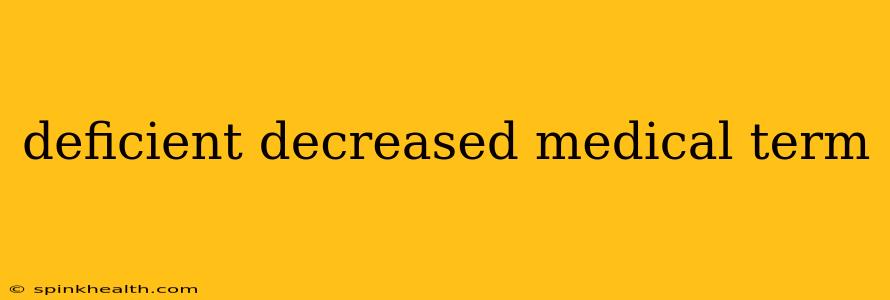Have you ever seen a medical report mentioning terms like "deficient" or "decreased"? These words, while seemingly simple, carry significant weight in the medical field, indicating a reduction below a normal or expected level of something vital. This exploration delves into the nuances of these terms, revealing their meanings and contexts within the realm of healthcare. Imagine yourself as a medical detective, piecing together clues from lab results and patient histories. Let's unravel the mystery of "deficient" and "decreased" together.
What does "deficient" mean in medical terms?
In medical terminology, "deficient" implies a serious lack or shortage of a necessary substance or function. It’s not just a minor reduction; it signifies a level that is insufficient to maintain optimal health. This deficiency can pertain to various aspects, including:
-
Nutrient Deficiencies: A classic example is vitamin D deficiency, which can lead to weakened bones (osteoporosis) and other health problems. The body isn't getting enough vitamin D, resulting in a serious functional deficit.
-
Hormonal Deficiencies: Hormone deficiencies, such as growth hormone deficiency in children, can have profound developmental consequences. Here, the body doesn't produce enough of a crucial hormone to support normal bodily functions.
-
Enzyme Deficiencies: Some genetic conditions cause enzyme deficiencies, impacting metabolic processes. These deficiencies can lead to a build-up of harmful substances or a lack of essential molecules needed for bodily functions.
The word "deficient" paints a picture of a significant shortfall, highlighting the need for intervention and treatment to restore balance.
What does "decreased" mean in medical terms?
"Decreased," on the other hand, is a broader term indicating a reduction below a normal or baseline level. While it suggests a shortfall, it doesn't automatically imply a clinically significant deficiency. It describes a drop in levels, which could be temporary, minor, or a precursor to a deficiency. Let's illustrate with examples:
-
Decreased Hemoglobin: A decreased hemoglobin level might indicate anemia, but not necessarily a severe deficiency. The reduction could be mild and easily corrected through dietary changes or supplements.
-
Decreased Blood Pressure: A decreased blood pressure reading could signal hypotension, which can range from mild to severe. The level of concern depends on the degree of reduction and accompanying symptoms.
-
Decreased Kidney Function: Decreased kidney function, expressed as a reduced glomerular filtration rate (GFR), indicates a decline in kidney performance. The severity, however, depends on the extent of the decrease and its impact on overall health.
What is the difference between deficient and decreased?
The crucial difference lies in the severity and clinical significance of the reduction. "Deficient" signifies a serious lack with significant health implications, often requiring medical intervention. "Decreased" describes a more general reduction that may or may not be clinically significant, requiring further investigation to determine the underlying cause and the need for treatment.
Is decreased always bad?
Not necessarily. While a decrease often warrants attention, it doesn't always indicate a problem. Some decreases might be normal physiological variations or responses to treatments. For example, a decrease in inflammation after treatment is a positive sign. The context is paramount.
What are some examples of deficient and decreased levels in the body?
Numerous bodily substances can be deficient or decreased. Examples include:
- Vitamins (A, B12, D, etc.)
- Minerals (Iron, Calcium, Magnesium, etc.)
- Hormones (Thyroid hormone, Insulin, Testosterone, etc.)
- Blood cells (Red blood cells, White blood cells, Platelets)
- Enzyme levels
- Organ function (Kidney, Liver, etc.)
How are deficient and decreased levels diagnosed?
Diagnosis typically involves:
- Physical examination: Assessing symptoms and overall health.
- Blood tests: Measuring levels of various substances in the blood.
- Urine tests: Analyzing substances excreted in urine.
- Imaging tests: Such as X-rays, CT scans, or ultrasounds, to visualize organs or tissues.
- Genetic testing: To identify genetic conditions causing deficiencies.
Understanding the subtle yet crucial differences between "deficient" and "decreased" in medical terminology is paramount for both healthcare professionals and patients. It allows for a more accurate interpretation of medical reports and a more informed approach to health management. Always consult with a healthcare provider for proper diagnosis and treatment of any suspected deficiencies or decreased levels.

